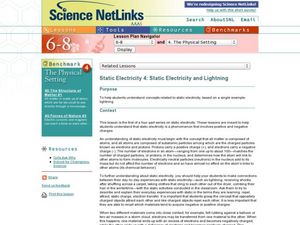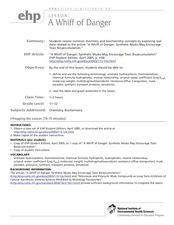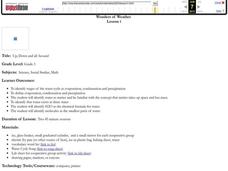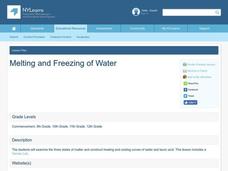Curated OER
Water Erosion and the Effects of Earthquakes
High schoolers participate in an activity in which they simulate geological events such as earthquakes and erosion. For a fifteen to twenty minute time period, they shake a jar with 100 grams of marble chips and water. They measure the...
Curated OER
Air Masses
Students are given maps depicting two or more air masses and they then categorize bodies of air by temperature and moisture characteristics. They recognize large regions of similar type air. Students are given a map of air temperatures...
Curated OER
Mass Percentage and Empirical Formulas
In this chemical compounds instructional activity, students write the chemical formula and formula mass for given compounds. Students will compare the number of moles of compound in different samples. Students determine empirical...
Curated OER
Mix and Match Mass
In this science worksheet, learners examine some random items and estimate the mass according to the measurements given. Then they complete the lab.
Curated OER
Water and Ice
Students observe water as it changes form. In this water lesson students observe, measure, and describe water as it changes state.
Curated OER
Non-Nutrients: Fiber and Water
Students discuss how much fiber and water a person needs each day. They use beans soaked in water to show the benefits of water to the human body. They also learn the health benefits to eating healthy.
Curated OER
Water and Ice
Students observe what happens to water as it goes from a solid to a liquid. In this exploratory lesson students gain an understanding for the water cycle while working in groups observing what happens to water as it changes state.
Curated OER
Dewey and Chemistry: The Water Cycle Revisited
Students undertake a series of experiments related to the water cycle. All experiments use John Dewey's experiential philosophy as their bases. Each instructional activity is clearly based on philosophy and attempts to be relevant.
Curated OER
Water and Ice
Students examine water. In this chemistry lesson plan, student examine the physical properties of water and how it changes from a liquid to a solid or a gas. This lesson plan contains links to a second and third complimentary lesson plan...
Curated OER
Amazing Water Changes
Students explore the properties of water and how it changes states. In this kindergarten to 2nd grade science lesson, students pair a hands-on science activity with two suggested books. This inquiry lesson has extension activities to...
Curated OER
Will It Sink Or Float?
Have your class predict whether objects will sink or float in water. Learners consider a data table of mass, volume and whether the object sank or floated. They develop an evidence-based explanation for the results.
Curated OER
A Whiff of Danger
Public health trainees read and write a summary of the article, "A Whiff of Danger". The article is not available through the link, but can be found on the National Center for Biotechnology Information website. After summarizing,...
Curated OER
Wonders of Weather
Fourth graders complete activities to study weather and the water cycle. In this water cycle lesson, 4th graders observe a demonstration of the three stages of water. Students work in groups to complete a water cycle lab activity....
Curated OER
Moles
In this moles worksheet, students review solubility, moles of solute, molar mass, and colligative properties. This worksheet has 10multiple choice questions and 11 problems to solve.
Curated OER
Galileo's Thermometer: Measuring the Density of Various Unknown Liquids
Sprouting scientists explore the concept of density by making mass and volume measurements for five different liquids. From these measurements, they calculate densities. They apply their learning to explain Galileo's thermometer works...
Florida International University
Designing an Autonomous Underwater Vehicle (AUV): Concepts in Lift, Drag, Thrust, Energy, Power, Mass, and Buoyancy
Engineer an autonomous underwater vehicle (AUV) to study concepts of physics. Using household materials, collaborative groups design and build an AUV and then test Newton's Laws of Motion as they apply them in underwater environments...
National Park Service
Weather Patterns of the Pacific Ocean
How do oceans affect weather patterns? Learners define vocabulary associated with dew point, topographical lifting, condensation, and formation of clouds and precipitation as they explore the weather in the Pacific Northwest. They also...
Curated OER
Water Density and Stability Lab
Students observe how different water densities and salinity control the depth at which different water masses occur. Submarines are used as a case study. This is a well-designed with an excellent worksheet.
Curated OER
Walking on Water
Students use this problem to help them to relate to force vectors: Suspend a meterstick horizontally between two tables. Place a 1kg mass in the middle of the meterstick. Notice the bend of the meterstick. Explain why the meterstick...
Curated OER
Melting and Freezing of Water
Students examine the three states of matter. They identify the segments of heating and cooling curves. Students analyze data and create a graph to determine the freezing and melting temperature of water.
Santa Monica College
Introducing Measurements in the Laboratory
We use basic units of measurement to break down things and communicate clearly. The first lesson in an 11-part series teaches the proper way to measure various items. It starts simply with measuring the dimensions and areas of geometric...
Integrated Physics and Chemistry
Law of Conservation of Matter
Does mass change during a chemical reaction? Demonstrate the Law of Conservation of Matter while encouraging class members to be creative with a two-part lesson. First, learners use Alka-Seltzer® tablets and water to demonstrate the...
American Chemical Society
Controlling the Amount of Products in a Chemical Reaction
Everyone enjoys combining baking soda and water. Here is a lesson that challenges scholars to analyze the reaction three different ways — the real substances, the chemical equation, and the molecular models. Class members experiment to...
NASA
The Cycle of Matter
An educational activity focuses on the idea of conservation of matter through a demonstration of the water cycle, a discussion of digesting food, and the path of carbon and oxygen atoms as they change form.
Other popular searches
- Conservation of Mass Water
- Mass vs. Water Displacement
- Mass vs Water Displacement
- Mass of Cubic Meter of Water

























